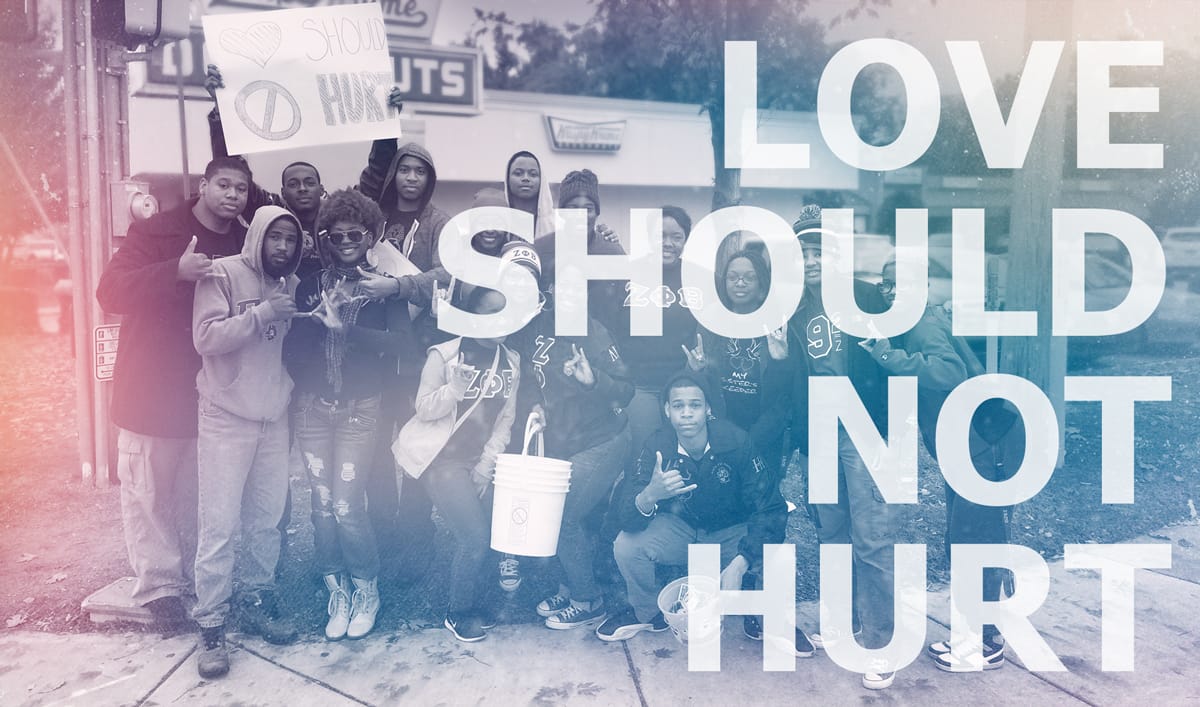How One Frat Took a Stand Against Abuse on Campus

It took a lot of guts for Deborah Monroe to return to East Carolina University. As a student at ECU, her boyfriend had beaten her, thrown her out of a car, and threatened her with a loaded gun.
Seven years later, Monroe is now an author, advocate and speaker on intimate partner abuse. She was invited back to campus last fall by Alpha Phi Alpha, a ECU fraternity that co-sponsors “Black & Blue,” an annual event that raises awareness about domestic violence.
For Monroe, returning to campus was particularly fraught — her abuser had been a member of Alpha Phi Alpha.
Alpha Phi Alpha Takes a Stand
But Alpha Phi Alpha has a long tradition of activism on behalf of minority groups, the disenfranchised and the voiceless. The first intercollegiate Greek-letter fraternity for African-Americans, its members include Martin Luther King, Jr. Paul Robeson, Adam Clayton Powell, Jr. and Thurgood Marshall.
“The founders inspire us,” says ECU chapter president Kristopher Montford-Brown. “They began by being shunned on campus and chose to become leaders.”
Alpha Phi Alpha sponsored “Black & Blue” in conjunction with the Zeta Phi Beta sorority to shed light on the problem of domestic abuse, particularly in the African-American community, where a recent study found that African-American women were murdered in domestic offenses a rate more than two and a half times higher that Caucasian women.
Sometimes Stories of Abuse are Swept Under the Rug
For Montford-Brown, hearing the stories of other people who grew up abused or with abusers was a revelation. “We don’t always know people’s true stories,” he said. “When I was growing up, my dad would put his hands on my mom. I used sports as a reason not to be in the house. I went to after-school tutoring. Who wants to go to after-school tutoring? I just didn’t want to be home. But I learned that you don’t have to accept abuse or let it control your life.”
When she came to campus for “Black & Blue,” Monroe shared her own story. She also talked about a funeral she attended while a student there – for the mother of an Alpha Phi member, who had been murdered by her husband.
ECU is the third-largest university in North Carolina and hosts over 25,000 students. Although there are few reported instances of abuse or rape at ECU, Sue Molhan, the ECU Office of Victim Services spokesperson, believes there are a substantial number of unreported cases. “Students don’t report it because it’s usually an acquaintance,” Molhan told the Greenville Reflector, referring to the “silent epidemic.” “People also are not sure sometimes if what happened to them would count as a crime.”
Lt. Amy Davis, the Division Commander of ECU’s Crime Prevention/Community Affairs, calls sexual assault “the most underreported crime in our society.” And, according to the National Coalition Against Domestic Violence, females ages 20-24 are at the greatest risk of intimate partner violence. One survey on college women found that about 3 percent had been victims of rape or attempted rape in a single academic term. At a campus the size of ECU this translates to over 350 attacks per year — 100 times the reported number.
Alpha Phi Alpha is Creating Solutions to Help
Campus police, university administration and service-minded Greek organizations now offer a slate of programs on date rape, familial and intimate partner violence throughout the year. Alpha Phi Alpha members participate in most of the events, including organizing serious programs like “The Morning After,” a help program for date rape victims, and participating in playful protests against gender violence, like the annual “Walk a Mile in Her Shoes,” where male ECU students literally walk one mile in women’s high heels.
Both Montford-Brown and Monroe believe that the spirit of cooperation among the local and national organizations is a necessity when facing an issue of this magnitude.
“We can’t do it by ourselves,” says Monroe, “We have to commit to each other.”
Together We Can End Domestic and Sexual Violence






